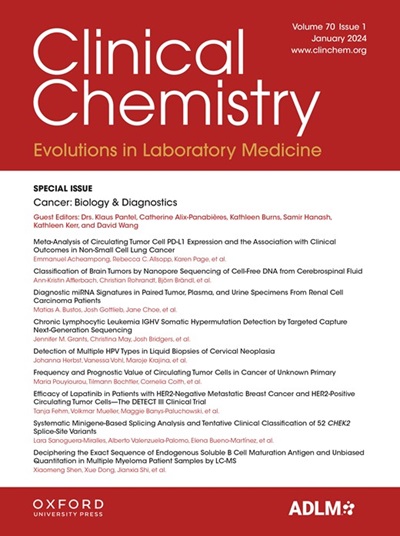A-354 Evaluating Emergent POC Technology for Sickle Cell Testing in Resource Limited Settings
IF 6.3
2区 医学
Q1 MEDICAL LABORATORY TECHNOLOGY
引用次数: 0
Abstract
Background Sickle cell disease (SCD) represents a collection of inherited hematological disorders characterized by abnormal sickle-shaped erythrocytes resulting in an increased risk of morbidity and mortality. SCD represents a significant global health burden, affecting more than 300,000 newborns per year. Most of these births occur in resource limited areas, including sub-Saharan Africa, where the mortality rate before the age of five is estimated to be as high as 50-80% and the existing infrastructure and resources cannot support most current and robust methods that offer hemoglobin variant detection and quantification for the diagnosis and monitoring of SCD. While newborn screening programs (NBS) to identify individuals affected with SCD have demonstrated efficacy in reducing morbidity and early mortality, NBS programs are limited outside of the US and Europe and face many practical challenges for universal implementation in a resource limited setting. The need for inexpensive and reliable hemoglobin variant detection and quantification at the Point of Care is essential to the diagnosis and management of SCD in resource limited settings with a high prevalence of SCD, and the expansion of NBS programs. This study aims to evaluate an inexpensive testing strategy using two methodologies for POC screening and confirmation of SCD that could be supported in a low resource setting. Methods The two-step testing strategy for evaluation of POC testing for hemoglobin variant detection and quantification included testing residual specimens from normal and known sickle cell patients by first screening with the HemoTypeSC, a qualitative lateral flow immunoassay (LFIA) that has improved sensitivity and specificity from other available LFIA methodologies given the use of monoclonal antibodies for the detection of hemoglobin variants. Confirmatory testing and quantification of hemoglobin variants was accomplished with the use of the Gazelle POC test a miniaturized chip-based cellulose acetate electrophoresis device capable of identification and quantification of normal and variant hemoglobin. Statistical evaluation of device performance and clinical agreement between the device and known disease status was achieved in EP evaluator. Results The two-tier testing strategy demonstrated effective and inexpensive mechanism for SCD screening and confirmation. Overall, the HemoTypeSC and Gazelle demonstrated 100% qualitative agreement between methods, with the total cost of the two-tiered testing strategy estimated at under $6 per sample. Conclusions In conclusion, the two-tiered approach using the HemoTypeSC and Gazelle yielded a practical and cost-effective strategy for screening and confirmation of hemoglobin variants for the detection and monitoring of SCD. Both the strip and chip-based methodologies provide rapid results, are accessible at the point-of-care, and require minimal sample volume, a feature ideal for use in a pediatric population in low resource settings. Overall, these methods show promise for the use and expansion of NBS programs to improve public health initiatives for the diagnosis of SCD.A-354 在资源有限的环境中评估镰状细胞检测的新兴 POC 技术
背景 镰状细胞病(SCD)是一组遗传性血液病,其特征是镰状红细胞异常,导致发病和死亡风险增加。SCD 给全球健康带来沉重负担,每年影响 30 多万新生儿。这些新生儿大多出生在资源有限的地区,包括撒哈拉以南非洲地区,据估计,这些地区五岁前的死亡率高达 50-80%,而现有的基础设施和资源无法支持目前最可靠的血红蛋白变异检测和定量方法来诊断和监测 SCD。虽然用于识别 SCD 患者的新生儿筛查计划(NBS)已证明能有效降低发病率和早期死亡率,但 NBS 计划仅限于美国和欧洲以外的地区,并且在资源有限的环境中普及实施面临许多实际挑战。在资源有限且 SCD 患病率较高的环境中,要诊断和管理 SCD 并扩大 NBS 项目,就必须在医疗点进行廉价、可靠的血红蛋白变异检测和定量。本研究旨在评估一种廉价的检测策略,该策略采用两种方法进行 POC 筛查和确认 SCD,可在资源匮乏的环境中得到支持。方法 评估血红蛋白变异体检测和定量的 POC 检测的两步检测策略包括:首先用 HemoTypeSC 检测正常和已知镰状细胞患者的残留标本,这是一种定性侧流免疫分析(LFIA),由于使用单克隆抗体检测血红蛋白变异体,其灵敏度和特异性均优于其他可用的 LFIA 方法。血红蛋白变异体的确证检测和定量是通过 Gazelle POC 检测完成的,这是一种基于芯片的微型醋酸纤维素电泳设备,能够识别和定量正常血红蛋白和变异血红蛋白。EP 评估人员对设备性能和设备与已知疾病状态之间的临床一致性进行了统计评估。结果 两级检测策略为 SCD 筛查和确诊提供了有效而廉价的机制。总体而言,HemoTypeSC 和 Gazelle 两种方法之间的定性一致性达到了 100%,两级检测策略的总成本估计低于每份样本 6 美元。结论 总之,使用 HemoTypeSC 和 Gazelle 的双层方法为筛查和确认血红蛋白变异体以检测和监测 SCD 提供了一种实用且经济有效的策略。基于条带和芯片的方法都能快速得出结果,可在医疗点使用,且所需样本量极少,非常适合在低资源环境下的儿科人群中使用。总之,这些方法显示了使用和扩大 NBS 计划以改善 SCD 诊断的公共卫生措施的前景。
本文章由计算机程序翻译,如有差异,请以英文原文为准。
求助全文
约1分钟内获得全文
求助全文
来源期刊

Clinical chemistry
医学-医学实验技术
CiteScore
11.30
自引率
4.30%
发文量
212
审稿时长
1.7 months
期刊介绍:
Clinical Chemistry is a peer-reviewed scientific journal that is the premier publication for the science and practice of clinical laboratory medicine. It was established in 1955 and is associated with the Association for Diagnostics & Laboratory Medicine (ADLM).
The journal focuses on laboratory diagnosis and management of patients, and has expanded to include other clinical laboratory disciplines such as genomics, hematology, microbiology, and toxicology. It also publishes articles relevant to clinical specialties including cardiology, endocrinology, gastroenterology, genetics, immunology, infectious diseases, maternal-fetal medicine, neurology, nutrition, oncology, and pediatrics.
In addition to original research, editorials, and reviews, Clinical Chemistry features recurring sections such as clinical case studies, perspectives, podcasts, and Q&A articles. It has the highest impact factor among journals of clinical chemistry, laboratory medicine, pathology, analytical chemistry, transfusion medicine, and clinical microbiology.
The journal is indexed in databases such as MEDLINE and Web of Science.
 求助内容:
求助内容: 应助结果提醒方式:
应助结果提醒方式:


